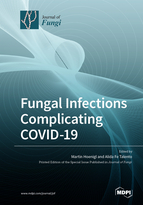Fungal Infections Complicating COVID-19
A special issue of Journal of Fungi (ISSN 2309-608X).
Deadline for manuscript submissions: closed (1 August 2020) | Viewed by 67595
Special Issue Editors
2. Section of Infectious Diseases and Tropical Medicine and Division of Pulmonology, Department of Internal Medicine, Medical University of Graz, Graz, Austria
Interests: clinical mycology; mold infection; aspergillosis
Special Issues, Collections and Topics in MDPI journals
2. Department of Clinical Microbiology, Royal College of Surgeons, Dublin, Ireland
Interests: clinical mycology; aspergillosis; candidiasis; antifungal stewardship
Special Issue Information
Dear Colleagues,
This Special Issue will be dedicated to fungal infections complicating coronavirus disease 2019 (COVID-19).
Opportunistic infections following respiratory viral infections has been recognized since the 1918 influenza pandemic. Although the vast majority of COVID-19 cases are mild to moderate, approximately 15% of patients diagnosed with COVID-19 require hospitalization and supplementary oxygen, and 5% of patients develop critical disease with acute respiratory distress syndrome (ARDS) and require ICU admission. ARDS may also be a consequence of infections with other respiratory viruses, like influenza, where invasive pulmonary aspergillosis (IPA) occurs in up to one-third of critical ill patients. Although the pathophysiology of COVID-19 is not completely understood, it is plausible that immune dysregulation and lung damage stemming from COVID-19 immunopathology facilitate Aspergillus superinfection in a way that is at least partially distinct from other respiratory viruses. From Wuhan, epidemiological studies indicate that invasive fungal infections may occur in between 4–5% of COVID-19 episodes requiring ICU admission. Given that in Wuhan galactomannan testing is rarely available and fungal diagnostics are sparse, this is likely an underestimate of the real burden of IPA in patients with COVID-19 requiring ICU admission. Recent reports from Europe indicate that IPA may occur in up to 30% of COVID-19 patients requiring ICU admission.
This Special Issue will focus on fungal infections complicating COVID-19, ranging from basic science papers elucidating pathophysiology and immunology, including mycobiome studies; to diagnostic studies evaluating microbiological and clinical/radiological findings; to clinical studies and observations (including case reports and case series) of fungal infections complicating COVID-19. While the primary focus will be invasive fungal infections, large case series of non-invasive fungal infections (e.g. thrush) will be considered as well.
Prof. Dr. Martin Hoenigl
Dr. Alida Fe Talento
Guest Editors
Manuscript Submission Information
Manuscripts should be submitted online at www.mdpi.com by registering and logging in to this website. Once you are registered, click here to go to the submission form. Manuscripts can be submitted until the deadline. All submissions that pass pre-check are peer-reviewed. Accepted papers will be published continuously in the journal (as soon as accepted) and will be listed together on the special issue website. Research articles, review articles as well as short communications are invited. For planned papers, a title and short abstract (about 100 words) can be sent to the Editorial Office for announcement on this website.
Submitted manuscripts should not have been published previously, nor be under consideration for publication elsewhere (except conference proceedings papers). All manuscripts are thoroughly refereed through a single-blind peer-review process. A guide for authors and other relevant information for submission of manuscripts is available on the Instructions for Authors page. Journal of Fungi is an international peer-reviewed open access monthly journal published by MDPI.
Please visit the Instructions for Authors page before submitting a manuscript. The Article Processing Charge (APC) for publication in this open access journal is 2600 CHF (Swiss Francs). Submitted papers should be well formatted and use good English. Authors may use MDPI's English editing service prior to publication or during author revisions.
Keywords
- COVID-19
- SARS-CoV-2
- galactomannan
- radiology
- aspergillosis
- thrush
- candidiasis
- intensive care
- mycobiome
- antifungals
- antifungal resistance







